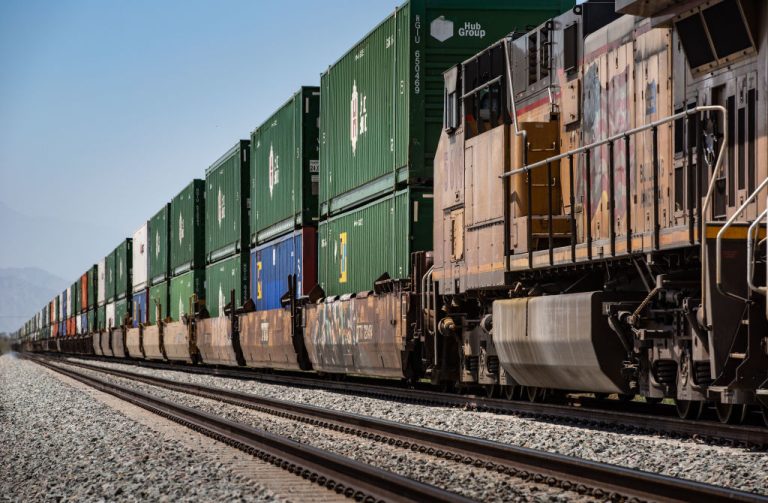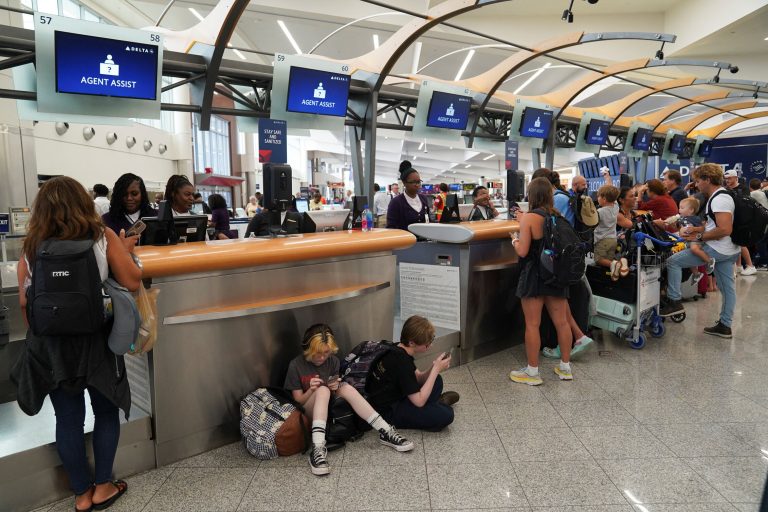The United States may face an immediate and severe crisis if a looming strike by railway worker unions that could come into effect as early as 12:01 a.m. on Monday, July 18, if not intervened in by the Biden administration.
However, intervention would put Biden and the Democrats at odds with workers and the unions as the October primaries hang in the balance.
Transport industry analyst publication FreightWaves reported on July 13 that Members of the Brotherhood of Locomotive Engineers and Trainmen, described as “one of the rail labor unions involved in negotiations between rail workers and the freight railroads over a new labor contract,” voted in favor of striking.
99.5 percent of participating members voted yay to the motion.
MORE ON ECONOMIC CRISIS
- US Rail Carriers Are Cutting Fertilizer, Grain, Coal Shipments
- The Cost to Hire a Trucker Is Crashing, but It’s the Busiest Time of Year
- Truckers Spending $1,200+ to Fill Up as US Diesel Prices Set 25-Year High
- Consumer Demand for ‘Crap’ Is Dying, Bloating Retailer Inventories: Analysts
Under the Railway Labor Act, unionized workers must obtain federal permission to strike.
Success
You are now signed up for our newsletter
Success
Check your email to complete sign up
The situation emerges from a contract dispute harkening back to pre-COVID September of 2020 over wages and healthcare benefits.
FreightWaves noted that the National Mediation Board (NMB) had “stepped in earlier this year to mediate,” but added that, unfortunately, “negotiations are still at an impasse.”
As a result, the NMB released the unions and the railways from mediation and initiated a 30-day cooling off period, which is set to expire the morning of July 18.
July 14 reporting by Financial Times characterized the situation as one that “tests Biden’s union-friendly pledge.”
FT says that 112,000 employees could walk off the job in an industry that amounted to 28 percent of U.S. freight transport in 2020.
Federal law “allows the US president to delay any work stoppage for 60 days by appointing an emergency board to investigate the stalemate,” FT said.
They added, “If Biden does so before the cooling-off period ends on Monday, unions would be forbidden to strike until after the board adjourns and the parties wait out a second cooling-off period ending in September.”
The outlet explains the quandary: Biden campaigned on a promise to be the “most pro-union” President in history, a vow that produces a tense quagmire for his embattled Democratic Party, which already faces the process of getting steamrolled by a “Red Wave” in the October primaries.
Should the Democrats lose a significant number of seats to the GOP in the primaries, the Biden Administration faces the prospect of losing control over the House of Representatives, and even the Senate.
The on-the-job situation for railway workers is reportedly an unpleasant one at the moment. The World Socialist Web Site, a heavily Marxist, left-wing, pro-union outlet, described current job conditions as “Hell on Earth” and “intolerable” in a July 14 article.
One worker told the outlet, “I was forced to take stimulants to stay awake and sleeping pills to sleep, then more stimulants to wake up from the pills I took to go to sleep. It got to where I couldn’t sleep at all, then I would fall asleep for way too long and couldn’t wake up.”
The cause of their consternation, they state, is the implementation of Precision Schedule Railroading (PSR).
PSR has been extensively covered by FreightWaves as being core to the unions’ disputes, one of the key reasons being that “the operational model also seeks to cut costs, and one way to cut costs is to reduce employee headcount.”
Since 2016, overall headcount has dropped from more than 150,000 to slightly over 100,000, data from the Surface Transportation Board showed.
A July 14 article, also by FreightWaves, described the situation on work sites across the country as “incredibly chaotic.”
One 18-year veteran told the outlet that the current hiring class at industry leader Union Pacific is “dropping like flies.”
The article explained why this is more confounding, “A railroad engineer or conductor typically earns a six-figure salary, retires with a pension and enjoys union benefits. They don’t need a college degree; the monthslong training is provided on the job.”
However, today’s workers are now getting burned out, “It used to be a job with eight- or nine-hour shifts and plenty of time at home…railroading demands too much time away from one’s family and workdays that last up to 19 hours, combining 12-hour shifts with hours of waiting around for transportation or relief crews.”
Union Pacific declined to provide comment for the article, stating that Q2 corporate earnings were due to be announced on July 22.
FreightWaves noted that the liner boasted a $1.6 billion profit in Q1.
Q2 analyst estimates for Union Pacific’s revenue, however, are up more than $400 million over Q1, and at a time that the company’s stock value has declined from slightly over $250 to slightly over $205 amid an economy and stock market entering a severe recession.
Financial Post noted that railway strikes are no joke. The last one happened as far back as 1992 and cost the economy $50 million per day.
Trade groups across various industries that rely on railways to transport their goods, such as the critical fertilizer industry, wrote to Biden for help.
“For retailers, the next few months are the busiest shipping period of the year as they begin preparing for the holiday season. Virtually none have contingency plans for how they will keep shelves stocked without the railroads,” FP stated.







